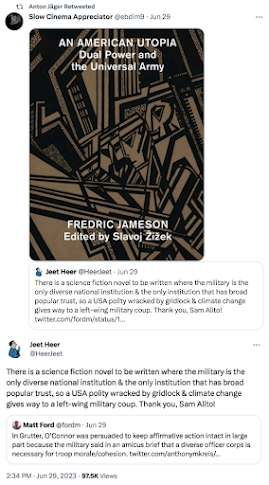Someone write a pol theory essay on how this is a perfect model for proletarian dictatorship https://t.co/AJrUExJsbV
— Anton Jäger (@AntonJaegermm) June 30, 2023
"Neither Marx nor Engels lived to see the imperialist epoch of world capitalism, which began not earlier than 1898–1900" Lenin 1916
— Adam Tooze (@adam_tooze) July 1, 2023
The chronological specificity of this is striking. Imperialism =/= Empire or settler colonialism.
And "wealth" itself is an irrational concept. It is an almost mystical process, the setting of ethical values: Arising from the irrational, transforming the irrational to the rational, yet nonetheless it is the irrational that radiates from within the resulting form." Broch, as always.
If the PRC is the Moses we need against global warming, it should go the same way when the crisis is done. Exception as fact not as theory. It's almost refreshing that the next hegemon won't have the baggage of Christian hypocrisy. Monotheism is disaster.
Tooze isn't actually interested in democracy; he wants government to help the people. Any question of informed consent is secondary.


One minute Western elite was worrying earnestly about balance of democracy and capitalism and announcing a new social contract, next we are assigning both fiscal & monetary policy to hammer inflation & maintain financial stability cos .. TINA. C'mon ...! https://t.co/8jtuOkaHRe pic.twitter.com/0ooUMGcXuJ
— Adam Tooze (@adam_tooze) June 29, 2023
Derek Brower, FT, An energy editor’s farewell reflections
Capitalism won’t deliver the energy transition fast enough . . .
There’s too much to do, and given the urgency and the need to get the solution right, this isn’t a task for your favourite ESG-focused portfolio manager or the tech bros. The sheer scale of the physical infrastructure that must be revamped, demolished or replaced is almost beyond comprehension. Governments, not BlackRock, will have to lead this new Marshall Plan. And keep doing it. The western nations that did so much of the damage will have to finance the transition in the developing world — it is astonishing that this idea is still debated. Massive deficit spending will be necessary, not a new ETF. For all the cleantech advances and renewable deployment in recent decades, fossil fuels’ share of total global energy use was 86 per cent in 2000 and 82 per cent last year.
. . . and nor will Big Oil
Remington was good at typewriters, but not the personal computer. Why expect ExxonMobil or Saudi Aramco to lead — or even survive — a shift from their core business of digging up fossil fuels and selling them? And do you really want them to? In the US, the Joe Biden administration has implored drillers to pump more oil, not less; liquefy more shale gas for export, not less. Shell’s and BP’s share prices have risen since they said they would slow down their retreat from oil.
If we want oil companies to stop selling fossil fuels we should consume less of them and we should vote for governments that make them more expensive, not less. Yes, our physical infrastructure has been built over decades around petroleum use. Yes, oil companies have lobbied forever to preserve this arrangement and slow down alternatives. But no one is compelling those of us in the rich world to fly so much, drive Escalades, devour so much meat, or buy so much stuff.
Oil demand will hit a new record high this year, with almost half of it still burnt in the rich 38 countries of the OECD. Don’t fly across Europe for your skiing holiday or business meeting and then complain that the poor world isn’t doing enough on climate and that BP is still making jet fuel.
Is Russia’s war good for the energy transition?
Optimists think Russia’s weaponisation of gas supplies and brutal violence in Ukraine will speed up the transition from fossil fuels that sustain Vladimir Putin’s regime. Maybe. The IRA and REPowerEU suggest so. Europe certainly isn’t going to be rushing to buy more hydrocarbons from Russia.
But India and China have used western sanctions on Russia as an opportunity to deepen their dependence on its (cheaper) crude. Germany has become a newly minted LNG buyer in less than a year, while Europe’s rush to hoover up cargoes has priced out countries such as Pakistan, forcing them back to coal. The White House was so scared about rising gasoline prices after the invasion that it drained its emergency oil reserves and begged Texas frackers and Saudi Arabia to boost supplies. The G7’s entire goal in the price cap was to keep Russian oil flowing, not stop it. A lesson of the war: western leaders talk a lot, but stomaching fossil fuel supply disruptions is hard.
The next few years will be messy
Either we ignore the consensus of the world’s best scientists and accept an ever-deteriorating climate, or we upend a multitrillion-dollar fossil fuel-based energy system created over decades. For obvious reasons it would be better to decarbonise and clean the energy system, avoiding the trauma of a ever-heating world, while trying to manage the political fallout. But powerful petrostates such as Saudi Arabia and the UAE — in charge of this year’s COP climate conference — won’t go quietly. The transition could put weak petrostates like Iraq in peril. Big Oil lobbyists will fight tooth and nail to stop change and influence elections. Saying the geopolitics of the energy transition will be volatile seems like an understatement.
The beginning made me laugh
Energy professionals are more interesting than others
Mercenaries and inner-city schoolteachers run them close. But there isn’t another sector that combines worldly experience, mechanical knowhow, practical economics and politics. My colleagues covering banks speak to people wearing suits. I got to interview rig-hands in Siberia, warlords, climate activists, solarpanel installers in Texas, ‘wildcatting’ billionaires, and Baghdadi politicians. Objectively, these are more interesting people.

No comments:
Post a Comment
Comment moderation is enabled.